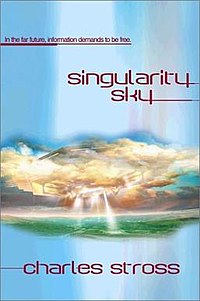Singularity Sky
From Wikipedia, the free encyclopedia
| Singularity Sky | |
 Cover of first edition (hardcover) |
|
| Author | Charles Stross |
|---|---|
| Country | United Kingdom |
| Language | English |
| Genre(s) | Science fiction novel |
| Publisher | Ace Books |
| Publication date | July 1, 2003 |
| Media type | print (hardcover & paperback) |
| Pages | 400 pp |
| ISBN | 0-441-01072-5 |
| Followed by | Iron Sunrise |
Singularity Sky (hardcover ISBN 0-441-01072-5; softcover ISBN 1-841-49334-1) is a science fiction novel by author Charles Stross, published in 2003. It was nominated for the Hugo Award for Best Novel in 2004.
A sequel, Iron Sunrise, was published in 2004.
[edit] Plot introduction
Singularity Sky is set in a universe where human societies have been involuntarily taken from Earth and widely distributed, seemingly at random, across the galaxy in the aftermath of a technological singularity. The events in Singularity Sky take place some time after the immediate aftermath of the singularity.
[edit] Plot summary
The apparent cause of this distribution of humans is the mysterious and immensely powerful posthuman entity which calls itself "the Eschaton". Although the Eschaton is usually benign and uninvolved in human affairs, it strictly enforces certain rules on human civilization out of apparent self-interest.
To this end, the Eschaton has helpfully left a message throughout human space, for example, engraved in huge letters on the sides of mountains, and dispersed everywhere throughout computer networks. The message is as follows:
- I am the Eschaton. I am not your God.
- I am descended from you, and exist in your future.
- Thou shalt not violate causality within my historic light cone. Or else.
The most important commandment of the Eschaton appears to be "thou shalt not violate causality"; that is, the Eschaton strictly prohibits the use of faster than light travel for reaching any point in its own relative past, with the ominous proscription "or else". The Eschaton apparently makes use of time travel itself, but whenever a civilization attempts to break this rule, it is forcibly prevented from doing so immediately before the act (often with immense overkill, such as in at least one case where the relevant civilization's star is induced into going supernova). The Eschaton is inscrutable and uncommunicative and beyond disseminating the knowledge of its laws generally does not provide further warnings before it acts.
The Eschaton's other major involvement is that at a particular point in the book's history, it scattered pieces of human civilization, against their will, throughout nearby (within a few thousand light years) space, but it did so using instantaneous travel, and in some cases actually moved them backwards in time. This means that some civilizations, such as the Festival mentioned below, have been progressing for hundreds of years on their own before they encounter the rest of human civilization.
Although human civilization on Earth collapsed in the wake of singularity, by the time of the events in Singularity Sky, Earth has recovered and become one of the more powerful and influential human societies. The Earth non-government, known as the United Nations and descended from the modern-day Internet Engineering Task Force, uses its agents to prevent other civilizations from breaking the Eschaton's rules so as to avoid the Eschaton taking enforcement action which may affect the very existence of Earth and the wider galaxy-spanning human race.
Unknown to human civilization at large, the Eschaton also has its own human agents working to this end. The novel features the exploits of one such agent, Martin Springfield, an engineer specializing in faster-than-light starship engines who is hired by the New Republic (a totalitarian and relatively backward neo-luddite civilization) to upgrade the faster-than-light engines of their fleet of warships. The UN also suspects that the New Republic may attempt to use the upgraded engines to violate causality, so it dispatches one of its agents, Rachel Mansour, to the New Republic.
This attempt comes to pass sooner than expected when the New Republic colony on Rochard's World encounters the Festival, a spacefaring transhuman civilization/entity which trades highly advanced technology if prospective recipients can respond to the request: "entertain us". The old world order on Rochard's World quickly breaks down under this onslaught. Interpreting the failure of communications with the colony as the result of enemy action, the New Republic dispatches a mighty war fleet to Rochard's World, with Martin Springfield and Rachel Mansour aboard the flagship.
[edit] External links
- Audio Review at The Science Fiction Book Review Podcast
- A review (2/5) - A heated debate about the role of ideas versus strong story in SciFi
- A review (89%)

